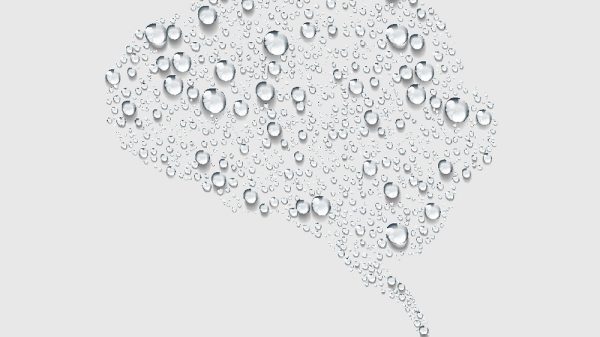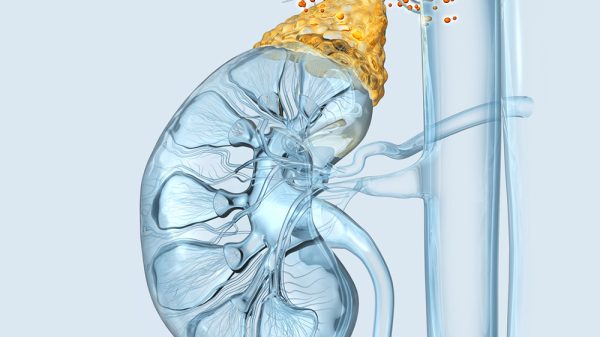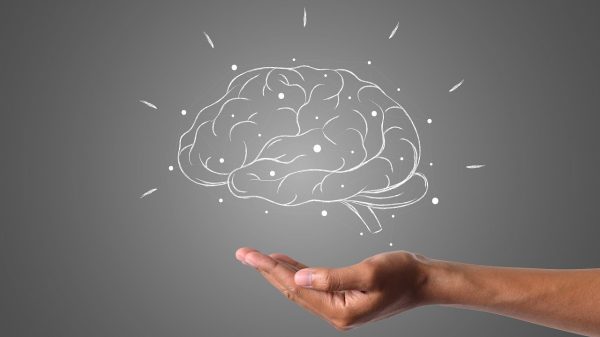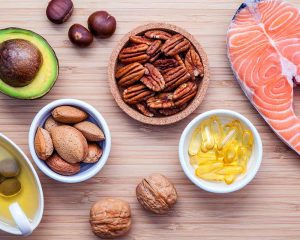The name of the game when it comes to brain health is following an anti-inflammatory lifestyle and diet. Interestingly, many natural remedies for mood and brain health also work as protectors against liver damage and inflammation. Keep reading to find out about foods, lifestyle changes, and supplements that may serve as natural mood enhancers.
Foods for Brain Health
What you eat impacts your mood and cognitive functions. When food passes through the digestive system, compounds are absorbed through the intestinal membrane and enter the bloodstream, where they are transported to the brain. If compounds can pass through the blood-brain barrier, they can impact cognition for better or for worse.
Here are foods that support a positive mood and healthy cognitive processes.
1. Healthy Fats
Fatty fish like salmon contain eicosapentaenoic acid (EPA) and docosahexaenoic acid (DHA), two omega-3 fatty acids that are critical to supporting the structural component of brain cells as well as reducing inflammation. Other sources of EPA and DHA include mackerel, tuna, and sardines.
You can also get healthy fats from a variety of plant sources. Alpha-linolenic acid (ALA) is another omega-3 fatty acid found in flaxseeds, chia seeds, hemp seeds, and walnuts.
2. Antioxidants
Fresh fruits, vegetables, whole grains, and nuts are primary sources of antioxidants. Antioxidants are compounds that work as the clean-up crew for cells. They clear cells of reactive free radical species, which interact with cellular components to inflict damage and get in the way of healthy functioning.
Polyphenols in fruits, veggies, whole grains, and nuts exhibit lots of antioxidant activity that may enhance neuronal communication and fight against symptoms of anxiety, depression, and chronic stress. High consumption of polyphenol-rich foods is linked to better brain health and the prevention of age-related cognitive alterations.
3. High-Quality Protein
Amino acids from high-quality protein sources serve as starting materials for producing neurotransmitters that are responsible for regulating mood and emotions. The body is unable to synthesize essential amino acids, so it’s particularly important to get all essential amino acids from dietary sources.
High-quality protein sources that contain all essential amino acids include nonfat dairy and meat, like cheese, yogurt, chicken, turkey, fish, and beef. Soybeans, tofu, and tempeh are plant sources of protein that contain all essential amino acids.
4. Balanced Macronutrients
Healthy fats are good for your brain, but so are carbohydrates and protein. Depriving your body of any macronutrient results in brain cells that don’t have sufficient fuel. Fats are needed to fortify the brain cell structure. Carbohydrates are needed to provide glucose molecules, which are the raw materials that the mitochondria use to produce energy. Amino acids from protein are used in synthesizing neurotransmitters and enzyme activity that support proper neuronal communication.
Supplements
The role of supplements is to provide more of certain nutrients that you would normally get through food. As a reminder, always make sure your supplements are made by high-quality brands and get approval from your doctor to make sure supplements are right for you.
1. Probiotics
The digestive system isn’t the only function that benefits from regular probiotic intake. Interestingly, probiotics may also have an impact on brain function. Healthy bacteria present in the gut aid food digestion and produce metabolic byproducts that enter the bloodstream and travel to the brain. These compounds may play a significant role in regulating mood and alleviating depression and anxiety.
Probiotic supplements can be found at your local grocery store, drug store, or health food store. In addition to probiotic supplements, consuming prebiotic foods that are rich in fiber may help support the growth of a healthy gut microbiome. Prebiotic foods include artichokes, peas, onions, lentils, pistachios, and apples.
2. Essential Amino Acids
Amino acids are the smallest components of protein that our body requires for nearly all metabolic processes. Usually, we think of the importance of protein for muscle growth, not necessarily brain support. However, essential amino acids are also critical for enhancing mood, energy, and focus.
In particular, the essential amino acid tryptophan is vital to the production of serotonin, a neurotransmitter that is key to promoting a positive mood, regular sleep cycle, and appetite. Phenylalanine is another essential acid that plays a role in producing dopamine, a neurotransmitter that influences our feelings of happiness and motivation. (1)
Instead of buying tryptophan or phenylalanine supplements, consider an amino acid supplement that contains optimal ratios of all essential amino acids. Taking large amounts of one amino acid may cause an amino acid imbalance. The body works hard to promote homeostasis and balance among all hormones and neurotransmitters in the body.
Over-supplementing in one amino acid will not necessarily provide the results that you want. Instead, seek carefully-balanced amino acid supplements that provide the ratios of essential amino acids for ideal functioning across all organ systems, including the brain.
3. Polyphenols
Polyphenols with antioxidant activity are naturally found in fruits, veggies, whole grains, nuts, seeds, and beans. Though getting these nutrients from their natural sources is always ideal, sometimes it is difficult to get a high concentration of certain polyphenols from food alone. This is where supplements come into play. Certain concentrated forms of polyphenols, like trans-resveratrol, may help improve your mood while also decreasing systemic inflammation.
4. Vitamin D
The vast majority of the American population is deficient in vitamin D. Vitamin D is vital for promoting healthy bones, immune response, and neurological functioning. Vitamin D deficiency has been associated with inflammatory conditions, autoimmune diseases, and bone diseases like multiple sclerosis, rickets, osteoporosis, metabolic syndrome, and fatty liver disease.
The best form of vitamin D for supplementation is vitamin D3, also known as cholecalciferol. Supplements are often available in two forms: vitamin D3 and vitamin D2. Always choose vitamin D3 supplements because they exert a bigger impact on our health than D2. For maximum absorption of vitamin D3, make sure that you’re getting enough calcium and magnesium in your diet.
Research shows that vitamin D may be critical for improving mental function and mood and may be a curative vitamin for anxiety. A study published in the International Journal of Preventative Medicine found that vitamin D supplementation resulted in improved markers of inflammation and less anxiety in diabetic women. (2)
5. Vitamin B Complex
B vitamins are necessary for numerous biological processes involving enzymes. Dietary B vitamins include vitamin B1, vitamin B2, vitamin B3, vitamin B5, vitamin B6, vitamin B9, and B12, which are also known as thiamin, riboflavin, niacin, pantothenate, pyridoxine, folate, and cobalamin. Biotin is also categorized as a B vitamin. B vitamins function as cofactors in biochemical reactions and allow enzymes to successfully carry out their jobs to produce DNA, harness energy from the foods we eat, and synthesize neurotransmitters and hormones. In the brain specifically, vitamin B is necessary for facilitating neurotransmitter synthesis and boosting mood and energy. (3)
Vitamin B complex is one of the best supplements for energy and vitamins for stress since B vitamins are critical to facilitating cellular processes that produce energy.
Deficiency in vitamin B12 may actually be a factor that directly causes depression. In some cases, the administration of vitamin B12 resolves cases of depression and anxiety.
6. Omega-3 Fatty Acids
Supplements like fish oil are potent anti-inflammatory agents that contain docosahexaenoic acid (DHA) and eicosapentaenoic acid (EPA). Omega-3 fatty acids are one of the most effective natural remedies for depression because they support optimal brain function and quell inflammation. Supplementing with high-quality omega-3 fatty acids will ensure that you get a therapeutic dose that may be difficult to get through food alone.
7. Melatonin and Chamomile Tea
Melatonin is a compound that the body naturally produces to promote sleepiness. If you have trouble sleeping, taking a little melatonin may help you initiate sleep.
Chamomile is an herb that is known for its soothing effects. It may work in conjunction with melatonin to help you reach a calm mental state while preparing for sleep.
8. S-Adenosyl-L-Methionine
S-adenosyl-L-methionine, also known as SAMe, is a compound that the body produces naturally from the essential amino acid methionine. SAMe is active in many biochemical pathways and is responsible for donating methyl groups to influence the biological use of free amino acids, enzymatic functions, and DNA expression. Some research shows that SAMe may improve symptoms of depression. (4)
Additionally, research published in the American Journal of Clinical Nutrition suggests that SAMe may also have protective effects on liver cells. (5) SAMe may even play a role in reducing liver inflammation and preventing fibrosis in liver disease.
9. Caffeine
Caffeine is naturally present in chocolate, tea, and coffee. Caffeine helps a lot of us wake up in the morning and we might not feel like ourselves until we’ve had a cup of our morning coffee. Science confirms that coffee is actually a mood-booster. Research shows that in a state of sleep deprivation, caffeine may help increase alertness and improve cognitive performance. (6)
Caffeine seems to exert effects on mood by increasing the production of neurotransmitters like dopamine. (7)
Adding coffee to your daily routine is a great way to regularly get caffeine. Plus, coffee has the added benefit of helping reverse inflammation and elevated liver enzymes associated with fatty liver disease.
Lifestyle
You can make changes to your lifestyle and routine that promote balanced brain chemicals, better nervous system response, and improved mood.
1. Get Some Sun Each Day
A little bit of sun helps your body synthesize vitamin D3, which increases your serum levels of vitamin D.
Sun exposure may also play a role in combatting seasonal depression. Getting some sun each day helps set your circadian rhythm so that you experience more wakefulness during the day. Making sure the retinas in your eyes are exposed to natural light may increase energy and improve mood during the day.
If you are impacted by seasonal depression or seasonal affective disorder, invest in a UV lamp that mimics the ultraviolet rays from the sun. A UV lamp may be especially useful if you live in a cold, rainy climate that receives very few hours of sunlight during winter months.
2. Get Regular Sleep
Do you know that cranky, irritable, and delirious monster that comes out when we don’t sleep? These unpleasant feelings are directly reflective of what’s happening in your brain when you don’t get regular sleep. When we’re deprived of sleep, our neurotransmitters don’t fire as they should and we experience mood shifts as a result.
Sleeping is crucial to maintaining mood stability and resilience to stress. During periods of rest, the body is hard at work repairing cellular damage from everyday functions as well as additional inflammation from stress, pollutants, and allergens.
Getting adequate sleep each night is important for resetting the mind and fighting against anxiety and depression.
3. Get Your Heart Pumping
Get your body moving and heart pumping with regular physical activity. Exercise releases endorphins in the brain that are correlated with lower levels of anxiety and depression. Plus, being in good cardiovascular shape strengthens your heart and blood vessels and lowers your blood pressure. Improved cardiovascular health results in better blood flow, allowing more nutrients and oxygen to reach the brain.
4. Regulate Stress
Stress can exert profound impacts on our mental functioning. Chronic stress can be brought on by emotional stress and physical demands related to trauma, work, finances, or relationships. We may recognize symptoms of stress as feeling more wound up than usual, having difficulty sleeping, and feeling anxiety.
Chronic stress manifests on a physiological level that impacts brain health and mood. The stress response, also known as the “fight-or-flight” response, causes adrenal glands to release epinephrine and norepinephrine. Being in a constant state of stress elevates the levels of cortisol in your blood, which can lead to inflammation. Chronically high cortisol can lead to many unpleasant symptoms like difficulty focusing, imbalanced hormones, cardiovascular issues, mood swings, depression, and panic attacks.
On a cellular level, chronic stress sets brain cells on overdrive to deal with a perceived stressor. Waste products build up as byproducts of cellular processes and may impede normal brain functions in a state called oxidative stress. This, in turn, may worsen mental symptoms of stress.
You can take steps to reduce your stress response by engaging in relaxing activities like yoga, meditation, and deep breathing. Other examples of stress-relieving activities include reading, watching a show, and listening to music.
Did You Know That Fatty Liver Disease Is Connected to Brain Health?
Brain function is closely tied to late-stage liver cirrhosis. When liver function is severely compromised, toxins accumulate in the bloodstream and travel to the brain. The resulting condition is hepatic encephalopathy, which can cause serious psychiatric symptoms like personality shifts, confusion, and memory loss.
But what about the relationship between fatty liver disease and brain health? Though not extensively studied, research seems to point to a connection between fatty liver disease and brain health.
A study conducted by researchers at the University of Milan in Italy points out that inflammation in the liver is connected to inflammation in the brain. The study brings to light that fatty liver disease is associated with activated microglia in the brain, which is a pathological pathway of brain dysfunction. (8)
Therefore, if you have fatty liver disease, it’s especially important to make changes that promote the health of both your liver and brain.
Precautions and Things to Keep in Mind
When seeking natural solutions for mental issues, it’s a good idea to exercise precaution in several areas.
1. Consult a Physician
Many prescription antidepressants address symptoms of depression by targeting serotonin and dopamine levels in the brain. There is evidence that natural foods and supplements may be effective in addressing stress, seasonal depression, and mild depression with fewer side effects than prescription medication.
More severe cases of mental illness, including moderate depression, mood disorders must be evaluated by a licensed physician. In all cases of mental illness, regardless of severity, it is best to seek medical attention. A healthcare provider can help determine whether you have a clinical case of depression or other mood disorder that requirements treatment with prescription drugs.
2. Avoid St. John’s Wort
St. John’s Wort is an herbal supplement that may show some success in improving symptoms of depression and anxiety. However, it’s best to avoid St. John’s wort if you have a liver condition like fatty liver disease. This herb may alter metabolic pathways in the liver and interact with medications, increasing the likelihood of liver damage.
3. Choose High-Quality Brands
When it comes to supplements, quality matters. The quality of a supplement will greatly impact its safety and efficacy. Plus, the Food and Drug Administration (FDA) does not evaluate dietary supplements for their role in improving or preventing certain conditions.
So, before buying a supplement, it’s important to do your research and consult your physician when deciding which supplements are right for you.
4. Avoid 5-Hydroxytryptophan
The body utilizes tryptophan to produce 5-hydroxytryptophan (5-HTP), which is then used to produce serotonin. There is insufficient evidence to suggest that supplementing with 5-HTP alone has a positive impact on mental health and mood. Research shows that 5-HTP must be consumed in combination with compounds that enhance its effects. Moreover, 5-HTP over time may even be detrimental to brain health and worsen symptoms of depression. (9)
Conclusion
Your brain and liver are two vital organs that play a part in determining your quality of life and wellbeing. Foods, lifestyle changes, and certain supplements may play a role in protecting the health of your brain and your liver to help you feel your best mentally and physically.
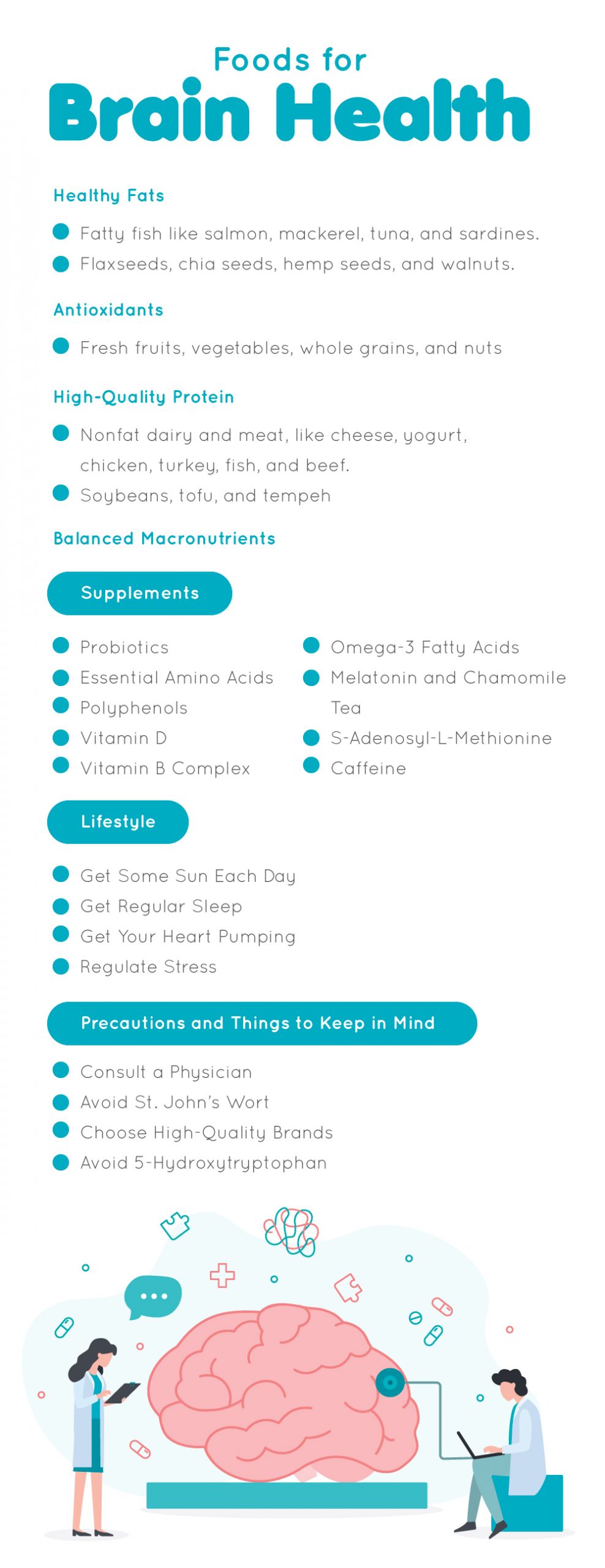
References:
(1) https://www.ncbi.nlm.nih.gov/books/NBK224629/
(2) https://www.ncbi.nlm.nih.gov/pmc/articles/PMC6390422/
(3) https://www.ncbi.nlm.nih.gov/pmc/articles/PMC4290459/
(4) https://www.ncbi.nlm.nih.gov/pmc/articles/PMC5501081/
(5) https://academic.oup.com/ajcn/article/76/5/1183S/4824268
(6) https://www.ncbi.nlm.nih.gov/books/NBK209050/
(7) https://www.ncbi.nlm.nih.gov/pmc/articles/PMC4462044/



